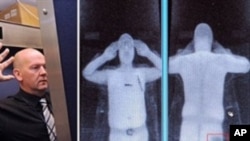A new security survey shows Britons are in favor of new body scanners introduced at British airports following the failed Christmas Day bombing on a U.S.-bound plane. When the scanners were introduced in Britain earlier this year, civil rights organizations claimed they were an invasion of privacy.
The Unisys Security Index tracks consumer security concerns. It surveyed 10,000 people across 11 countries. Unisys vice-president of global security solutions Neil Fisher says airport body scanners have been accepted in Britain.
"In a number of countries, but particularly the U.K., there was a general acceptance by the public, over 90 percent in U.K., that they would undergo body scanning if it meant they could have safe and secure travel," Fisher said.
Fisher says the result was a surprise since privacy advocates in Britain had alleged the scanners might be illegal.
"There has been a lot of controversy about the body scanner and the perceived wisdom from the press was that people were against it, they saw it as a privacy issue," Fisher said. "But our index, our survey, showed that actually the vast majority of people will give a certain amount of their privacy if it means they can have assured security."
In Holland and Australia the results were largely the same, but in two European nations the public reacted differently.
"We found that Belgium and Germany, in each country, one-in-three people would not undergo a body scan, which I think is quite surprising," Fisher said.
In Hong Kong, too, results showed a majority of people objected to going through a body scanner. Fisher says the different attitudes toward the scanners around the world could complicate efforts to coordinate international airport security.
Survey says Britons Approve of New Airport Body Scanners
